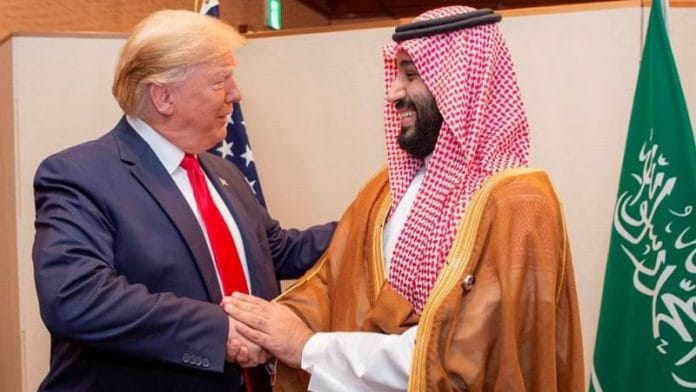The Middle East has radically transformed its geopolitical positioning in recent years, evolving from a region often characterised by conflict and instability to an increasingly influential diplomatic centre.
Key regional nations, notably Saudi Arabia, the United Arab Emirates, Qatar, and Oman, demonstrate greater strategic autonomy, moving beyond traditional alignments to act as crucial hubs for international diplomacy and conflict mediation. This evolving significance can also be understood from US President Donald Trump’s announcement about his first foreign trip to Saudi Arabia, with stops planned in Qatar and the United Arab Emirates.
This shift reminds us of what Saudi Crown Prince Mohammed bin Salman (MBS) stated in his 2018 statement: “I believe the new Europe is the Middle East.” This vision is gradually materialising not through infrastructure development alone but more significantly through changing power dynamics and diplomatic influence.
The new Europe
Mohammed bin Salman prominently articulated the concept of the Middle East as the “new Europe” during the Future Investment Initiative forum in Riyadh. He declared with conviction that “The Kingdom of Saudi Arabia in five years will be completely different,” highlighting his economic and political ambition for the region. The Prime Minister of the UAE and Dubai’s ruler Sheikh Mohammed Bin Rashid Al-Maktoum also endorsed the Saudi leader’s perspective.
Sheikh Mohammad Bin Rashid emphasised that the conflicts in the region, rather than being merely destructive, offer “further motivation to adopt modernisation and development.” He was suggesting that adversity could catalyse transformation. This shared vision among regional leaders represents a coordinated perspective on the Middle East’s future.
The vision highlights intriguing parallels between Europe’s post-World War II resurgence as a symbol of economic stability and cultural abundance. The Middle East might embark on a comparable path. For many years, this region has struggled with challenges and conflicts that often obscure its vibrant history, cultural diversity, and economic potential. The vision of Arab leaders challenges this narrative.
For centuries, Romans and Persians engaged in prolonged military and political contests over control of the Middle East. Its strategic location at the crossroads of Europe, Asia, and Africa made it an invaluable prize for any power seeking to dominate key trade routes, secure buffer zones, and access rich resources. However, today, it encompasses more than just geopolitical positions.
Also read: UAE is changing. Its leaders attended an iftar event at the BAPS temple in Abu Dhabi
Mediation, peace talks
What makes the “new Europe” analogy increasingly apt is the economic development occurring across Gulf states and the emerging role of Middle Eastern countries as mediators and hosts for significant international negotiations—a function historically associated with European capitals like Geneva, Vienna, and Paris.
The United Arab Emirates demonstrated the region’s increasing diplomatic influence by mediating a significant prisoner-of-war exchange between Ukraine and Russia in March 2025. This exchange saw 175 captives from each country return home, bringing the total number of people returned through Emirati mediation efforts to an impressive 3,233.
Ukrainian President Volodymyr Zelenskyy publicly acknowledged the UAE’s crucial role, thanking the Emirates for its efforts in returning Ukrainian defenders home. Russian President Vladimir Putin also praised the UAE’s mediation, thanking the President on call.
In March 2025, Saudi Arabia hosted critical negotiations between the US and Russia to make progress toward a ceasefire in Ukraine. These talks in Riyadh followed discussions between US and Ukrainian delegations, positioning Saudi Arabia at the centre of efforts to resolve one of the most consequential conflicts in recent years. United States Special Envoy to the Middle East Steve Witkoff, who has been leading the Russia-Ukraine negotiations, said that the talks in Saudi Arabia could pave the way for a “full-on” ceasefire.
This diplomatic initiative represents a significant shift in global power dynamics. By hosting these high-stakes negotiations, Saudi Arabia demonstrates its growing influence and willingness to engage in complex geopolitical issues beyond its immediate region.
Similarly, Oman has emerged as a crucial diplomatic intermediary, recently hosting indirect talks between Iran and the US on 12 April 2025. These negotiations, aimed at addressing Iran’s advancing nuclear programme, marked the first round of talks between Tehran and the Trump administration following years of heightened tensions.
The choice of Oman for these sensitive discussions highlights the growing trust in Middle Eastern nations to provide a neutral ground for contentious international negotiations. Oman’s Foreign Minister Sayyid Badr Albusaidi facilitated the exchange of messages between the US and Iranian delegations.
New chapter in global diplomacy
In the modern era, many factors, like strategic geopolitical positioning, are behind the rise of the Middle East as a diplomatic centre. However, one key factor is the relationship it cultivated with major nations over the years. This move is helping it today to tread this complex path of peace talks. For years, Gulf states have maintained sufficient neutrality to be accepted as mediators by various parties.
The emergence of the Middle East as a diplomatic powerhouse has started a new chapter in the evolution of global geopolitics. As these nations continue to host critical negotiations, mediate complex international disputes, and facilitate peace efforts, they are redefining traditional power dynamics and challenging the dominance of established diplomatic centres. The successful mediation of prisoner exchanges, hosting of peace talks, and facilitation of nuclear negotiations demonstrate that Middle Eastern countries have developed the capacity and the credibility to influence global affairs in ways previously reserved for European powers.
While the full realisation of the vision of Arab leadership remains a work in progress, the trajectory is clear: the Middle East is now characterised by its diplomatic contributions. As this evolution continues, the global community may witness the emergence of a “new Europe” in the Middle East—not in terms of cultural or political systems, but in its role as a pivotal centre of international diplomacy and influence.
The author is an Islamic thinker and author of ‘The True Face of Islam’. Views are personal.
(Edited by Ratan Priya)






